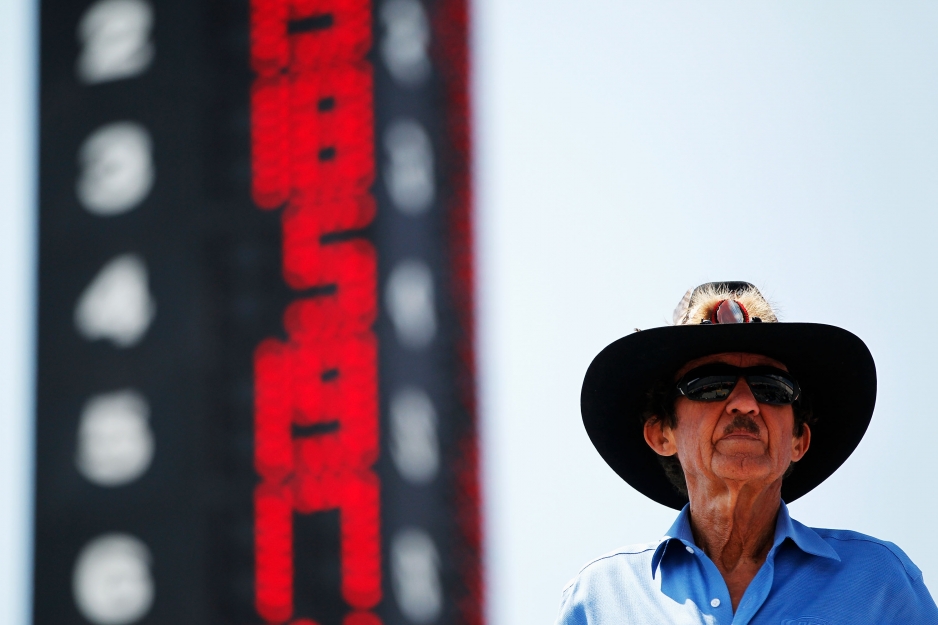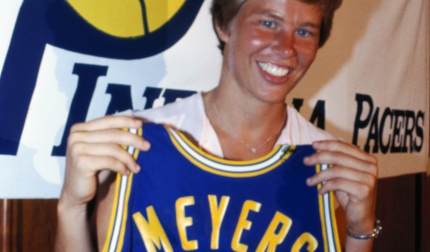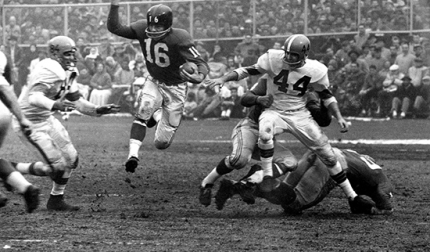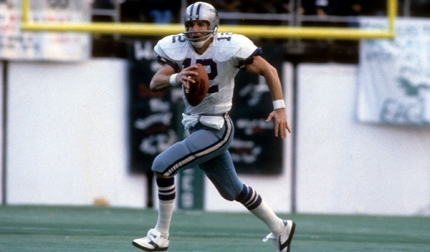What would you consider to be your career highlight?
Probably winning the 200th race, that was a big deal. Of all the things we’ve ever done in and out of racing, winning the Presidential Medal of Freedom, that was beyond the call of racing. Racing is what put you out there, but that got the whole lot together, you know? But that 200th win [on July 4, 1984]: When you think [Ronald Reagan] is there, first time we ever had a sitting president at a racetrack. Winning in front of him and it being the 200th, and winning on the last green flag lap, all that is just unbelievable when you turn around and look back at it.
Was racing always going to be your destiny, or was there something else you’d wanted to do?
Racing’s all we’ve been. My dad [NASCAR Hall of Famer Lee Petty] ran the very first [NASCAR Cup] race in 1949, and I was 11 years old. I grew up in a farming region, helping my uncles on the farm, but the racing was the big deal. I was able to work on the car, go to school, play ball—football, baseball, basketball—but all our neighbors would come home and milk cows and plow the fields, and I’d come home and work on the racecar.
Your dad memorable knocked you into the wall very early in your career, since he was trying to get ahead of you and you didn’t have the experience. Talk about an incredible bit of on-the-job training.
That basically was the first Cup race I ever run; it was in Toronto, Canada. He knocked me into the wall; he won the race, so that was the main deal. You can imagine how inexperienced I was. I didn’t grow up in the era where these guys start off in go-karts, and then they move up to legend cars and then a Saturday night deal, I didn’t do that; I jumped dead in the middle of the big-time deal. And it wasn’t that big-time back then, but it was just us. That was just the way the Petty crowd did things.
Your dad won the first-ever Daytona 500 in 1959 and then had a terrible accident at Daytona in 1961, and the Petty family team was turned upside-down. How did you manage?
Well, Daddy stayed in the hospital for four months, and my mother stayed down there with him. My dad always ran the racing part and my mom ran the money part [laughs]; she could tell him what he could buy and what he could do and all that kinda stuff. She kept all the books. Well, all of a sudden, my brother and myself were sent home and told to go get a car and start racing again, and we had no business experience, no leader, so somehow we both struggled through, with a lot of help from a lot of other people, don’t get me wrong, but we were the leaders of that deal. I’d work on the racecar during the day and then go home and try to keep the books at night. Then I think in July, Daddy came back, so we give the business part back over to Mother, and Daddy come in and kinda helped us get through the rest of the year. And that was ’61; in ’62, we had everything back together and started building from there.
Your dad was the first man to win three NASCAR championships.
My dad was the steady deal in my life. He wasn’t flamboyant or anything like that; he just went out and got the job done. He raced strictly to make a living. He wasn’t no showboat or any of that stuff because that didn’t pay any money. My dad had to finish the race, and I learned from the early go, because we didn’t have sponsorship at that time. Mother give you enough money to get to the racetrack and she expected you to make enough to get back home [laughs]. So we had to finish races instead of being flashy and all of that stuff. So we always worked on the conservative side.
Among your many records, this one seems quite unbreakable: winning 10 races in a row, in 1967. That really helped cement your fame inside and outside the sport.
We didn’t count our wins as we went; it was just, OK, what’s the next one? Then all of a sudden, when it ended, then you look back and say, it’s hard enough to run 10 races in a row and not have any trouble, even if you run tenth or fifth. There where some other people that had bad luck and our luck was better than theirs, some we outrun, but we had better luck. We had all the stars lined up; we just kept working hard, but everyone else did, too. It was one of those things where it just happened, and in the end it come out good for us.
And another unbreakable record: You won seven Daytona 500s. Nobody’s even close to that.
It’s really unbelievable. We won seven races, probably should have won four of them, lucked into three of them, then there was three or four more that we had bad luck and didn’t win, so it kinda evens everything out. But the deal is, you can’t compare.
You can compare some of the things that me and David Pearson done, but you can’t compare anything that Jimmie Johnson or Jeff Gordon’s done against Pearson or Petty. It’s a different ballgame now, run under different circumstances. We can’t go forward and say, what would we do against them, and they can’t go backwards and say what they would do against us. They’re beating their competition now and me and Pearson were beating our competition when we come through. What makes a winner is who you run against, who you’re playing against.
Same with football: You look at the quarterbacks playing now, you can’t compare them to the Montanas and all the greats way back. What if they had the same circumstances, with more people able to catch the ball, bigger linemen and all that, what would they have been? All you can do is look at the record of what people are doing today, not what they did 20 years ago. So you can’t compare the crowd coming through now with what happened 20 or 40 years ago.
The same goes for the cars, of course.
The safety back then was up to date for that time. They were the safest things going at the time. But if you go back 10, 15, 20 years ago from what they have now, you almost say, well, how did I survive? But the majority of the people did, and that’s the way it was. You look back in 1920, how rough the racecars looked, and how much better they looked when we got in them, we look back at some of them old cars and say, man, it’d take a tetanus shot just to get in them things—and they were winning races with them. Now the group that comes through in the cars today, and they look back at the cars from 30, 40 years ago and say, how did you do it? There was no power steering, no safety features, no air conditioning, no radios. We just went out and done it.
You did it, but it was rougher. I remember you once telling me, ‘I never should have raced with a broken neck.’
[Laughs] That would probably be the biggest danger I ever put myself in. You know, you had broken legs, broken feet or broken shoulders—you were OK to drive with that. But a broken neck is like having a concussion; one more time will get you.
Things started to get easier for you guys when STP came into the sport and became your main sponsor.
When STP came along in ‘72, it freed up a lot of that stuff that we did and how we did it. So we didn’t have to worry about if we had a bad day; we didn’t have to worry about having enough money to get to the next race. It probably also opened me up to drive a different way. I could be more aggressive, I guess, in getting the job done.
Now, of course, it’s all an ownership thing for you. How is Richard Petty Motorsports doing as you head toward this new season, and how do you rate your chances at victory?
We’re in a lot better shape than we were last year. Three or four years ago, we were at the bottom of the heap, because the guys that owned the team went bankrupt, and we had to buy it back and start with basically nothing, and they’ve come a long way. We’re going in the right direction for a change. This season, our partnerships and sponsorships are better than last year, all that stuff is coming together. We think we’re getting the crew and drivers a little bit better. We’re like everybody else; we’re very optimistic, looking forward to the beginning of the new season. Everybody’s a winner till you get to the racetrack.
What do you try to tell your drivers that they benefit most from?
Before the race starts, we’ll sit down and have a strategy deal: This is what you need to do, and what you have to watch out for. These are the circumstances you have to overcome. We’ll do the best we can here in the pit, but you have to do your job on the racetrack. The big deal I try to instill in our drivers is consistency. If the car don’t work good, don’t be complaining about it. This is it; this is all you got. So make due with what you got.
I know you and your son Kyle have had your tough moments. Could you assess how well you get along now?
We always got along, we just didn’t see eye to eye on some of the decisions each of us made. Now he’s going on his TV deal and we’re probably closer than we’ve ever been from that standpoint because I’m not controlling him and he’s not controlling me. We’re on different paths. We still work together with the Victory Junction Gang Camp and make appearances together, still do a bunch of stuff to help ourselves and to help racing and our sponsorships, so from that standpoint I guess we’re close because I’m not competing against him and he’s not competing against me.
Your grandson, Adam Petty died in a crash in 2000. But the creation of Victory Junction—which he inspired—is, in a way, as extraordinary an accomplishment as anything the Petty family has ever done.
Adam was 19 years old when he died, and when he was 18, him and his dad [Kyle] went, when they were in Daytona, to Camp Boggy Creek [one of the “Hole in the Wall Gang Camps founded by Paul Newman], and Adam looked around, seeing the kids, kids who can’t go to a regular camp because they’re too handicapped with whatever their problems are, and he saw what they were doing and he said, ‘Why can’t we do that in North Carolina?’ He came back and was out looking for land, talking to people, trying to get some interest in the community and from different people he talked to. And then we lost him.
Then we sat down and went, look: This is something that Adam, if he’d have been here, it might not have happened this fast, but it would eventually happen. For some reason, he was a 19-year-old kid that just loved kids. But I guess he looked around and saw how fortunate he was to have all the opportunities he had, and these other kids would never get that opportunity. We sat down one day, Kyle, myself and the family and said, Why don’t we do something in honor of Adam? And we said this is what we’re gonna do, and we talked to the Hole in the Wall Gang Camp guys and they said, Yeah, we can go ahead and [help you] do this. We went to the racing crowd, the drivers, everyone of them gave something to the camp or did advertising for it, NASCAR got behind it and the sponsors got behind it, fans got behind it, so we had a built-in business to begin with to go to, took us a couple of years and now we’re getting ready to celebrate our tenth year. We’ve seen 20,000 kids that wouldn’t normally get to go to a camp at all. It’s just been fantastic; we’ve had so many people volunteer, give money to make it work.
Adam…he was a good one. The good Lord just didn’t see fit to do it, and maybe he used Adam to get 20,000 kids happy, you know what I mean? A good tradeoff when we look at it from that standpoint, and that’s the way the rest of my family has to look at it.
There have been five classes announced in the NASCAR Hall of Fame; a Petty team member has been in four of them.
It’s been a team effort all the way. My brother [Maurice Petty] went into the Hall of Fame this year. So there’s me in the Hall of Fame, Dad in the Hall of Fame, and Dale Inman, our crew chief all those years, in the Hall of Fame, and now my brother who built all the engines is in the Hall of Fame. We had a lot of other people who worked for us and helped us and made things happen but these were the guys that called all the shots. To get the whole team in is unheard of.
You’ve always been the greatest ambassador NASCAR has ever had. What is your formula for the sport’s continued success?
I guess of all the sports there is, NASCAR is probably the most fan-friendly. That’s from a standpoint of the fans can interact with the drivers and the owners, so much more so than in any other form of sport, and I think that’s what carried us all these years. Plus, kids that are three years old and kids that are 93 years old can understand the sport. It’s not that complicated [laughs], you don’t really have to know the rules or all that, you just watch and see what’d going on.
I don’t know what the future holds as far as that’s concerned. I know as long as we practice the family deal, as long as we can have families get involved in racing—see, I’ve been here a long time, I get granddaddies come and bring their sons up and then they bring their grandsons up, and that’s the backbone of NASCAR, and as long as we can keep getting those next generations involved, it helps.
But the only thing is, there’s so much more competition with people’s money and time today then there was 20 or 40 years ago. You’ve got people doing flips on motorcycles and doing skateboarding, there’s all this competition to take those young people and run them in a different direction than cars. Cars are not as important to the generations coming along now then they were two or three generations back, because communication and the way you get around is now so much more convenient. Cars are not as important to the young people because Mom and Dad will take them where they need to go. When we were growing up, from the time you were 14 years old, you couldn’t wait till you were 16 so you could get your license. Now, most kids are 20, 21 years old before they get their license. So how do we keep the next generation involved in automobiles? It’s gonna be tough. But if you ever get someone to a race, the majority will be race fans. The deal is getting them there in the first place.
Or seeing your car and hearing your voice at the movies.
When it comes to the movie Cars, then all the young kids know me as “Mr. The King.” They seen that movie and then they got something to associate with racing, so that’s been a big plus on getting the younger kids interested in racing. We’ve had kids come from all over to our museum, to see one of the cars, and it looks like Mr. The King. Their parents will introduce me as Mr. The King. And sometimes it confuses them because there’s a person and there’s a car and they think I’m a car. [laughs] But whatever it takes to get them there is OK with me.
Speaking of next generations, tell me about meeting your great-grandson Adam, Kyle’s grandson, who was born in December?
That’s the first Petty out of the Richard Petty crowd. My brother had a bunch of kids. And my great-granddaughter, all of the ones that was married and had kids, they got different names at the end of them, even though they’re half Petty. Here’s a half Petty but his name is Petty. So there’ll be a lot of pressure on him in the long run.
For more information on Victory Junction Gang Camp, go to victoryjunction.org





